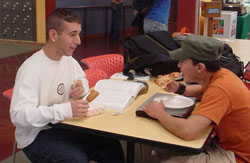
They have served their country, and now they are enrolling in school to serve themselves.
Close to 400 former military personnel are currently enrolled at Palo
Alto College. An education is what many soldiers seek when returning home
from service.
“I think the structure that the military gave me is helping ease my transition back into the civilian world. School is a good thing to keep my mind occupied after coming back from Iraq,” said Zachary Ferguson, a Fine Arts major, who was in the U.S. Infantry stationed in Baghdad. “I told myself when I got back I wanted to better myself so I didn’t have to do this again.”
Jason Casillas, a sophomore Kinesiology major, was stationed in Iraq.
Casillas said that his 4th Infantry Division 4-42 Field Artillery Battalion
was the unit that participated in capturing Saddam Hussein.
“It was very hot, man. If you consider life like going out and stuff
and having fun, it wasn’t like that at all. You had to do what you
had to do out there. I didn’t want to stay in the Army. I just wanted
something that is better for myself,” he said.
Curt Oswalt, a Computer Science major, said he was completely disabled while serving his country.
“I can’t work for anybody else so I’m getting an education, so I can work for myself out of my home,” he said.
Oswalt, who is in a wheelchair, said he had two years of physical therapy to learn to use his hands again.
“The military isn’t a job like other jobs where you go to work from nine to five and take weekends off and take vacations. I’ve been in three shooting wars, and when you’re in war, there’s no such thing as taking a day off. I remember being up for three days straight. If you don’t do your job, people die. I came back alive, and I have friends that can’t say that.”
Some students think that former soldiers who are returning to school should be given every opportunity to succeed.
“I think they should get more money to go to college, because they’re serving our country,” said Jay Verdin, a sophomore Accounting major. “We should do whatever it takes for them to get a really great education. When they come home, they should have the best jobs.”
For veterans with three years or more of service, the military pays $1,034 per month for a maximum of 36 months to those attending college full-time. For those with less than three years of service, the military pays $840 per month for a full-time course load. The benefits are available up to 10 years from the date of discharge.
“Military veterans have benefited from programs like the G.I. Bill. With that education, they have been able to get a good job and make a smooth transition to civilian life,” said Oliver Jones, a U.S. Government assistant professor. “It gives them an opportunity to make more positive contributions, and it also brings a perspective into the classroom, especially when subjects like the military or America’s involvement in various wars. Their experience becomes a source for class participation when those issues are raised in class.”
David Lee Seaton, a Criminal Justice major, said, “I want to get my Ph.D. in Criminal Justice, and I figured if I want to get a good career in the civilian sector, this is the place to start. I was in Saudi Arabia, and it was a pretty different way of life out there.” Seaton added that he retired from the military on May 31, 2005, and he is taking Internet classes.
The Veterans Affairs Office at Palo Alto College is open to serve those soldiers who want to attend school. The campus’ office provides helpful information, as well as specific requirements. Educational assistance programs include applying, eligibility and needed documents.
The Veterans Affairs Office is located in the Student Center, Room 126. Robert Ramirez, V.A. Coordinator, may be reached at (210) 921-5317.